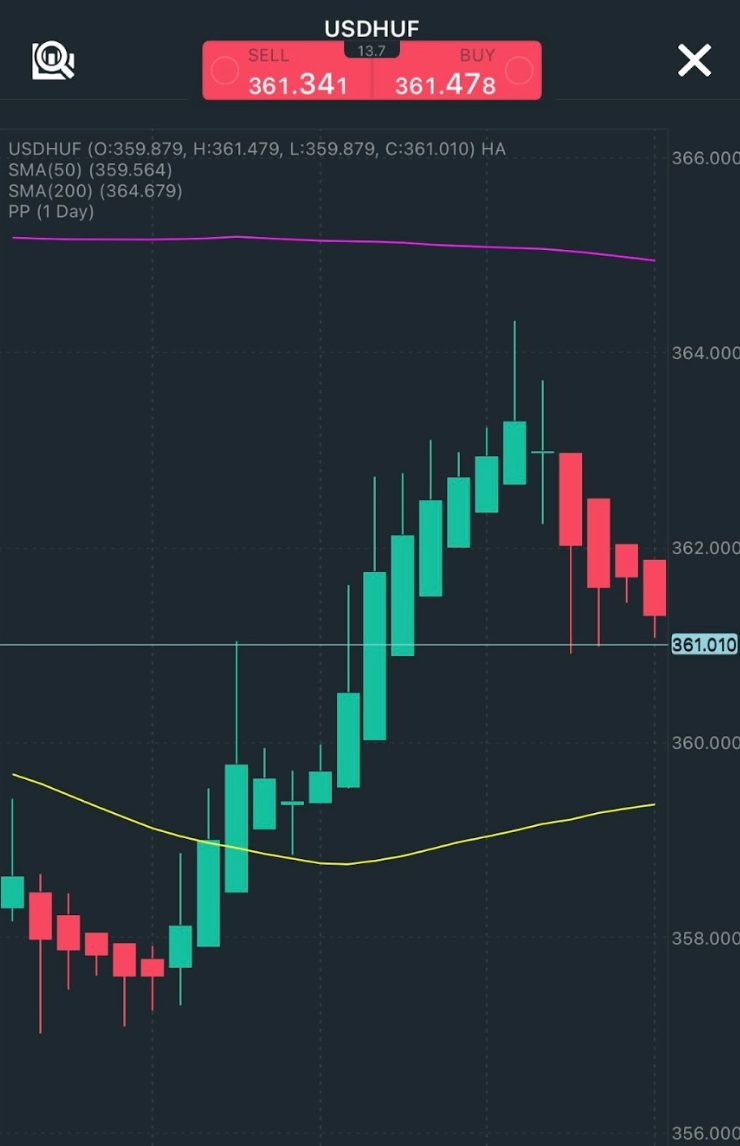Forex Trading in Hungary



Forex trading, which involves buying and selling currency pairs like those containing the Forint (HUF) to profit from fluctuations in exchange rates, has gained popularity in Hungary due to its accessibility and profit potential.
The Hungarian National Bank (Magyar Nemzeti Bank, MNB) regulates forex trading activities to ensure market stability and protect traders. However, Hungarians must adhere to both EU regulations and MNB guidelines, providing a secure trading environment for participants.
Quick Introduction
- The latest data from the Bank of International Settlements (BIS) shows that the average daily turnover of forex trades in Hungary totaled $6 billion in 2022, up from $4 billion in 2019.
- The most popular currency pairs to trade in Hungary typically include USD/HUF (US Dollar/Hungarian Forint), EUR/HUF (Euro/Hungarian Forint), and EUR/USD (Euro/US Dollar), offering high liquidity and tight spreads.
- Profits from trading currencies online are typically considered capital gains and subject to taxation of about 15%, with payments due to the National Tax and Customs Administration.
Top 4 Forex Brokers in Hungary
Based on our latest tests, these 4 platforms are top-notch for Hungarian forex traders:
How Does Forex Trading Work?
Forex trading involves speculating on currency pairs, such as those containing the Hungarian Forint, with the aim of profiting from changes in prices.
To start trading currencies you need to:
- Sign up with a top forex broker. Firms should be registered with the Hungarian National Bank (MNB) and adhere to ESMA EU regulations. You may need to provide personal information and verify your identity upon sign-up, for example through the Hungarian identity card (known locally as ‘Személyazonosító igazolvány’), to comply with anti-money laundering (AML) regulations.
- Deposit Hungarian Forints in your account. Some forex platforms support HUF accounts, making payments convenient and low-cost for Hungarian traders. Deposits are increasingly processed almost immediately, allowing for near-instant access to FX markets.
- Trade currencies using the desktop, web or mobile app provided by your brokerage. MetaTrader 4 (MT4), MetaTrader 5 (MT5) and TradingView are among the most popular third-party solutions. Hungarian traders may want to focus on currency pairs like USD/HUF, EUR/HUF, EUR/USD, GBP/USD and USD/JPY.
Is Forex Trading Legal In Hungary?
Forex trading is not only legal in Hungary but also regulated by the Hungarian National Bank (MNB), ensuring brokers comply with EU regulations to protect traders.
Hungarian brokers offer retail traders leverage and margin facilities that align with ESMA regulations and guidelines. These leverage limits are:
- Up to 1:30 for major currency pairs such as EUR/USD and USD/JPY
- Up to 1:20 for non-major currency pairs such as USD/HUF and EUR/HUF
Regulated Hungarian brokers operate within the framework of ESMA, providing retail forex traders with investor protection.This includes two critical levels of security: Negative balance protection, ensuring traders cannot lose more than their deposits, and client fund segregation, which mandates brokers to separate all client funds from company funds.
Is Forex Trading Taxed In Hungary?
Yes, forex trading is taxed in Hungary. Profits from forex trading are considered capital gains and are subject to taxation, which is generally around 15%.
It’s essential to keep detailed records of all trades and consult with a tax professional to ensure compliance with local tax laws.
Additionally, it’s important to note that losses from forex trading can be used to offset other capital gains, reducing the overall tax liability.
However, tax laws can be complex and may change, so it’s always best to seek professional advice.
When Is The Best Time To Trade Forex In Hungary?
- European Trading Session: 9:00 AM to 5:00 PM CET (Central European Time). The European session witnesses the highest trading volume and activity, mainly when London is open; London is still considered the global epicentre of FX trading. This period is ideal for trading EUR/HUF, USD/HUF, and EUR/USD pairs.
- Overlap of European and US Sessions: 2:00 PM to 5:00 PM CET. The overlap between the European and US sessions (the New York market opens at 2:00 PM CET) is particularly active. This session often features significant market movements and increased trading opportunities as news events in the USA dominate proceedings.
- Asian Session: 12:00 AM to 9:00 AM CET. The Asian session is usually less active for Hungarian traders. There is much lower liquidity and smaller price movements. However, the Asian session can be useful for trading specific currency pairs involving the yen (JPY) or the Australian dollar (AUD), especially if high-impact news events (listed on the economic calendar) miss or beat analyst predictions.
Example Trade
To help you understand how a forex trade could work in practice, let’s consider a scenario involving the Forint…
The Central Bank of Hungary lowered its key base rate by 25 basis points to 6.75% during a meeting, marking the tenth reduction since monetary easing began the previous year.
The annual inflation rate in Hungary eased to 3.7%, compared to market forecasts and an earlier month’s five-month high of 4%. However, it was still down markedly from a high of 17.6% in the last month.
In some ways, the MNB telegraphed the interest rate decision during the days and weeks preceding the rate reduction announcement.
Therefore, I decided to take a position based on the impending and somewhat inevitable reduction.
The only issues for me to judge involved when and where to execute the long USD/HUF position and when to exit the trade.
As widely predicted, the interest rate was lowered, and the value of HUF slumped versus its peers, especially as the Hungarian National Bank (MNB) accompanied the announcement with accommodative easing commentary, suggesting they intend to lower rates further if the economy continues to recover.
Before the interest rate announcement, I entered the market with a long USD/HUF position to avoid getting poor fills or experiencing wider spreads during the volatility that often accompanies an interest rate publication.
In such situations, I always place my stop-loss order at either the high or low of the previous session, depending on whether I’m taking a short or long position.
As seen in the H4 time frame, the red Heikin Ashi candles preceding the announcement made higher lows, often indicative of exhausting momentum. I avoided taking a long position until the second green candle was fully formed. This was a fullish candle with an upward wick/shadow, suggesting that the bulls controlled this currency pair’s direction.
Once the Doji began to form, indicating a balance between bullish and bearish traders’ sentiment, I was alerted that the trade sentiment might end. I exited the trade once the Doji fully formed and a full red candle was also formed.
Bottom Line
Retail forex trading in Hungary offers profit opportunities but requires knowledge and discipline. Prospective traders should focus on education and choosing licensed brokers to succeed in this market.
Forex trading in Hungary also involves understanding local regulations, using state-of-the-art trading platforms, and employing strategies and risk management to navigate the market.
To get started, see DayTrading.com’s pick of the best forex trading platforms.
Recommended Reading
Article Sources
- The Hungarian National Bank (Magyar Nemzeti Bank, MNB)
- Bank of International Settlements (BIS)
- Hungary - Trading Economics
- National Tax and Customs Administration
- TradingView Platform
- European Securities and Markets Authority (ESMA)
- Economic Calendar - TradingView
- Anti-Money Laundering (AML) Regulations - European Parliament
The writing and editorial team at DayTrading.com use credible sources to support their work. These include government agencies, white papers, research institutes, and engagement with industry professionals. Content is written free from bias and is fact-checked where appropriate. Learn more about why you can trust DayTrading.com



